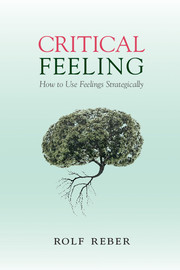Book contents
- Frontmatter
- Dedication
- Contents
- Preface
- Part I The basics of critical feeling
- Part II Applications of critical feeling
- 4 Happiness through critical feeling
- 5 The role of sensory and bodily feedback
- 6 Living together
- 7 Critical feeling in business and politics
- 8 Critical feelings at school
- 9 Music, art, and literature
- 10 Religion and morality
- Epilogue
- Notes
- References
- Index
10 - Religion and morality
from Part II - Applications of critical feeling
Published online by Cambridge University Press: 05 March 2016
- Frontmatter
- Dedication
- Contents
- Preface
- Part I The basics of critical feeling
- Part II Applications of critical feeling
- 4 Happiness through critical feeling
- 5 The role of sensory and bodily feedback
- 6 Living together
- 7 Critical feeling in business and politics
- 8 Critical feelings at school
- 9 Music, art, and literature
- 10 Religion and morality
- Epilogue
- Notes
- References
- Index
Summary
Religion thus makes easy and felicitous what in any case is necessary.
(William James 1985/1902, p. 51)I claimed in previous chapters that more knowledge enables a greater variety of feelings. This is certainly the case when people develop expertise. Wine experts have a wide spectrum of feelings because they have many years of experience in wine tasting and can therefore ground their evaluations in more fine-grained distinctions between different bouquets. A mechanic who understands the workings of an engine has more to enjoy and more to appraise than a novice who has no clue when it comes to engines. However, does richer knowledge broaden the spectrum of religious feelings? There are indications to the contrary. In the case of religion, history suggests that knowledge may overshadow experience, and psychological findings suggest that critical thinking undermines religious belief.
Knowing the workings of nature and technology may bring upon the diminishment of magical thinking and religious feelings. The German sociologist Max Weber (1946/1919) called this phenomenon disenchantment. He argued along the following lines: When humans did not understand the workings of nature, they felt awe for a world they did not understand. Nature was understood as the unfathomable work of a god or gods and therefore experienced with enchantment. However, as soon as people think that they understand what is going on inside nature and technology, they lose awe and religious attachment; they become disenchanted. Weber illustrated his theory with the following example: A person who understands the machinery that drives a streetcar – which in Weber's day was a major technical achievement, like smart phones nowadays – has a rational attitude toward this vehicle. Empirical evidence shows that people often overestimate the degree to which they understand technology (Rozenblit and Keil 2002) – who really understands the electronic machinery inside smart phones? However, it is not even necessary that a person understands the mechanics of streetcars or the electronics of smart phones in order to take this rational stance. It suffices that individuals have the impression that they might know how the technology inside a streetcar or a smart phone works to, in theory, become disenchanted.
Of course, one could argue that, the more a believer knows about religion, the richer their religious feelings despite their knowledge about the workings of nature and technology.
- Type
- Chapter
- Information
- Critical FeelingHow to Use Feelings Strategically, pp. 216 - 240Publisher: Cambridge University PressPrint publication year: 2016

